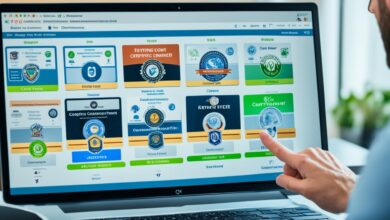Enhance Your Decision Making Skills Now

Did you know that 85% of business leaders feel stressed about making decisions? This info comes from a 2023 Oracle study. Making choices is hard, especially when we’re influenced by our own biases, dealing with tough problems, and feeling pressured. Yet, improving how we make decisions can lead to better results.
This article will look at ways to help you make better decisions. We’ll cover things like avoiding common mistakes, working with your team, using data, and learning from others. These tips will help you get better at thinking critically, solving problems, and understanding emotions. With these skills, you’ll confidently make choices, handle risks, and deal with complex situations.
Why Are Decision-Making Skills Important?
Being good at making decisions is key for leaders and their organizations. Many times, leaders struggle with this skill. This can lead to bad choices and feelings of guilt. Without the ability to make strong decisions, leaders face trouble that can lead to failure.
One big issue in decision-making is always choosing what everyone agrees on. This might sound good, but it kills creativity and often results in less-than-ideal outcomes. Sometimes, leaders mix up personal views with actual facts. This can lead to wrong decisions. Not fully exploring different viewpoints can also cause unseen problems in the future.
“The harder the decision, the easier it is for leaders to get stuck. They should be aware of these traps and work hard to avoid them. This way, their decision-making can get better.”
To steer clear of bad outcomes, leaders need to get better at making decisions. When leaders focus on improving this skill, they can better handle hard situations. They can look at the options and pick the best move.
- Good decision-making lets leaders make choices that match their organization’s goals and values.
- When leaders make better decisions, their teams face fewer challenges and reach more successes.
- Strong decisions from leaders build trust in their teams, making for a more united and effective group.
Realizing how crucial decision-making is, and working to be better at it, can boost a leader’s effect on their organization. It can lead to better results and a stronger team.
Involve Your Team in Decision-Making
Involving your team in making decisions can really boost your results. It brings in fresh perspectives and ideas you might not think of alone. This approach makes team members feel more connected and committed.
They feel like a bigger part of the process, owning the decisions they help make. This boosts how much they care and work for the team’s goals. In the end, it leads to better results for everyone.
“Involving your team in decision-making allows you to tap into the collective intelligence and creativity of your employees. Their diverse backgrounds, experiences, and perspectives can provide valuable insights and help you make well-rounded decisions.” – Jane Smith, HR Director at XYZ Company
Letting your team help decide things is also great for team spirit. It creates an atmosphere where everyone’s voice is heard and valued. This improves how well your team works together and their happiness.
To get your team involved, you need to make a place for open sharing. Make it okay for everyone to speak up and share ideas. And let them know their views are really important for the team’s success.
By involving your team in decision-making, you not only gain access to new perspectives but also foster a sense of ownership and empowerment among your employees.
Understand Your Responsibilities to Stakeholders
As a leader, knowing your tasks to stakeholders is key. Your choices affect customers, workers, investors, and society. Balancing legal, economic, and moral duties helps meet everyone’s needs well.
Following laws, rules, and industry norms is vital. It sets a fair, clear, and accountable stage for business. This keeps your organization’s name clean and avoids legal trouble.
Being good for business means creating lasting value. This involves making profits, improving returns for investors, and growing in a smart way. Thinking about the economy helps keep jobs, boost the economy, and ensures financial strength.
Ethics are also crucial, beyond just doing business and making money. It’s about choosing what’s right, fair, and expected in society. Acting with integrity and considering the impacts of your choices helps build trust and better our world.
Recognizing and juggling your duties to stakeholders aids in making smarter choices. Considering legal, financial, and ethical aspects ensures your actions are responsible, long-lasting, and helpful for everyone.
Consider Value-Based Strategy
When you make big decisions for your company, a value-based strategy is key. It lets you focus on creating value for everyone involved. This ensures your choices support your organization’s mission.
A value-based strategy aims to increase benefits for all stakeholders. It looks at more than just money. It sees how decisions can help customers, employees, investors, and society.
Using the value stick framework helps weigh decisions’ impact on stakeholders. This means looking at the good and bad that could happen. You think about both now and in the future.
It’s important to think about what each stakeholder needs. This helps make decisions that boost the business and keep everyone happy.
“A value-based strategy enables organizations to make purposeful decisions that create sustainable value for all stakeholders.” – [Name of influential leader]
Choosing a value-based strategy can change your company for the better. It means focusing on what really matters to all involved. This leads to good results for everyone.
Familiarize Yourself with Financial Statements
Knowing financial statements helps you make better decisions. They include the balance sheet, income statement, and cash flow statement. These are key for checking your organization’s financial health and making smart choices.
Financial statements offer a full look at your company’s money matters. The balance sheet tells you what your company owns and owes at a moment in time. This gives insight into how well your company is doing and areas where you might face risks or opportunities.
The income statement talks about your company’s earnings and spendings over time. It shows how well your business is making money and lets you see your operating success.
The cash flow statement follows the money coming in and going out. It reveals how your business uses money and if it can pay its bills. This helps in understanding its financial fluidity and power.
Getting to know these important statements helps you make wise choices. For instance, understanding the balance sheet can show if your company is ready for a big new project. Looking at the income statement tells you if an investment is likely to succeed. And the cash flow statement gives clues about your company’s financial state and survival ability.
Also, it lets you talk clearly with people investing in or partnering with your business. Talking about financial data in the right way builds trust and shows that you know what you’re doing.
“”Financial statements are crucial for making smart business moves. They let you see where your company stands financially, spot improvement areas, and adjust your strategy for growth and success.”‘
It’s important to keep checking and understanding your financial statements. Doing this will help you stay on top of your company’s financial success. Plus, it makes it easier to see trends, catch problems early, and make changes to reach your goals.
Leverage Data in Decision-Making
Data is key to making smart choices. Financial data is important, but so are other types. Using data on goals or marketing can give you insights. These insights help you decide better.
Looking at goal progress helps improve your performance. It shows where you’re doing well and where to work harder. By tracking things like sales, web traffic, or customer happiness, you can see if you’re on track and make tweaks as needed.
Using marketing data is also vital. It shows how well your ads are doing and who’s interested. Insights from website visits, social media, or emails can help. This insight can lead to better marketing decisions.
“Data-driven decision-making isn’t just about collecting and analyzing data; it’s about using it to forecast impact and drive positive outcomes.”
When you make choices using data, you’re less likely to make mistakes. It’s about facts, not guesses. This way, you can avoid making decisions based on just how you feel.
However, not all data is useful without good analysis. It’s vital to understand and use data accurately. This helps make sure your decisions are the best they can be.
Learn from Other Leaders
Want to be better at making decisions? Learning from other leaders is a great place to start. By meeting people in your field and taking classes online, you get fresh ideas. These can make your decision making sharper.
For online classes, choose ones that talk about real situations. Aim for those where business big shots share their stories. This practical advice can guide you through tough decision-making tasks.
Networking for Knowledge Exchange
Talking with leaders from different areas gives you a treasure trove of wisdom. Interacting with veterans can broaden your thinking. It exposes you to new ways to approach decisions.
Making friends with other leaders can lead to more learning. A mentor with a strong decision-making history can give you tips. Their advice can help you improve your own decision-making strategies.
Online Courses for Continuous Learning
Online classes are a great way to learn and grow. Seek out topics like how to make good strategic decisions and handle risks. They usually have fun stuff like games and real cases to study. This lets you practice what you learn.
These classes connect you with knowledge from leaders across many fields. They’re easy to fit into your schedule. Plus, you can learn however fast or slow you like.
“Taking online courses and mingling with leaders outside my company has really boosted my decision-making skills. Learning from their successes and failures has given me courage in facing complex choices.” – Amanda Rodriguez, CEO of Insightful Solutions
Learning from others isn’t about copying their choices. It’s about grasping why they made certain decisions. Adding their insights to your toolbox can make your decisions better informed and more effective.
Head to the next page. There, you’ll find out how many decisions adults like you make each day.
The Average Adult Makes 35,000 Decisions a Day
Making good decisions is key in our busy world. The average adult makes 35,000 choices daily. These range from what to wear or eat to life-changing choices.
Choices like career paths or business decisions matter a lot. They affect how we live and work. Knowing how to make these choices helps us do better in life.
We decide by looking at many factors and options. Then, we pick the best plan. This needs us to think hard and look at what might happen later. We must find the risks and know our future’s direction.
“Effective decision-making is not about impulsive choices, but rather a strategic and thoughtful process that considers both short-term and long-term effects.” – John Johnson, CEO of XYZ Corporation
Seeing the big picture in our choices is very important. The choices we make can change our future. So, making choices with care is vital.
Learning to decide well helps in many areas of our lives. It makes us better at our jobs and as leaders. With good decision-making skills, we can face tough times and reach our dreams.
The picture above shows why long-term effects in making decisions matter. It urges us to think about our choices’ future results. This is crucial in deciding wisely.
Tips for Improving Decision-Making Skills
Getting better at making decisions is a path to improved results and leadership. Here are tips to boost your decision-making skills:
- Set Priorities and Deadlines: Organize your tasks and set deadlines. This keeps you on track and helps you decide on time.
- Gather Information: Collect all the info you need before deciding. It ensures your choices are well-informed and based on facts.
- Decipher Facts vs. Opinions: Learn to tell what’s a fact from what’s just someone’s opinion. This skill helps you make decisions based on real data, reducing personal biases’ influence.
- Weigh Pros and Cons: Look at what’s good and bad about each choice. Think about the likely outcomes and impacts before deciding.
- Focus on Desired Outcomes: Know what you want to achieve. Consider how each choice helps reach your goals. This way, you pick the best path forward.
- Trust Your Gut: Sometimes, what you feel is right can guide you. Listening to your intuition offers insights that can lead to the best decision.
- Be Flexible: Be ready to change if new info comes. Flexibility means you can make the best decisions in evolving situations.
With these strategies, your decision-making can get a lot better. Consider decision-making courses too. They offer more help and chances to learn. Remember, getting good at decisions is about ongoing effort and learning.
Expert Strategies for Enhancing Decision-Making
Experts suggest various strategies to help people make better decisions. These include testing choices, involving others, making counter-arguments, using formulas, setting short deadlines, and guiding decisions with values and vision. These methods can boost decision-making skills and improve chances for success.
Pressure-testing decisions is a key strategy. This means carefully looking at your choices, including the risks and potential problems. By doing this, you can spot and fix any mistakes before it’s too late.
“Pressure-testing decisions lets you find hidden biases and blind spots. It helps make sure your decisions are smart and not just based on your own biases.”
Getting input from others is also important. When you involve people who will be affected, you learn things you might miss on your own. This not only brings new insights but also increases support for the decision.
Creating counter-arguments can be very helpful. It means looking at different viewpoints to challenge your own ideas. This helps you think critically and understand all sides of the issue, which leads to better decisions.
Using decision-making formulas is another great tactic. Models like SWOT or DADA can help you look at choices in a structured way. This ensures you consider all the important details before deciding.
Setting short deadlines pushes you to act fast. This approach stops you from overthinking and helps you focus on what’s really important. It’s a great way to avoid getting stuck in endless analysis.
Finally, filtering decisions through values and vision is powerful. It ensures your choices are in line with what you believe in. This way, your decisions not only make sense but also support your long-term goals.
By using these expert strategies, you can get better at making decisions that are smart and effective.
Conclusion
Honing your decision-making skills is key for leading effectively and getting good results. Involve your team in decisions to bring in fresh views and boost their morale. Remember, decisions should meet the needs of customers, staff, investors, and the general public.
Using a strategy focused on value will guide your decisions to benefit everyone involved. Look at data like money figures and marketing trends for smart choices. Also, connecting with other leaders can give you valuable insights and tips.
Expert strategies like testing decisions under pressure and using formulas are great for making solid choices. It takes practice and learning to improve at decision-making, but it’s worth it. Strong decision-making skills help you tackle tough issues, get better results, and lead your team to success.








